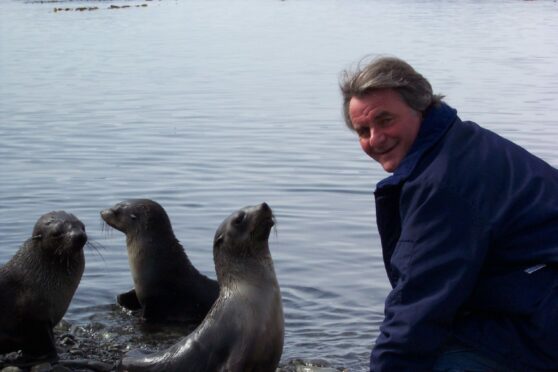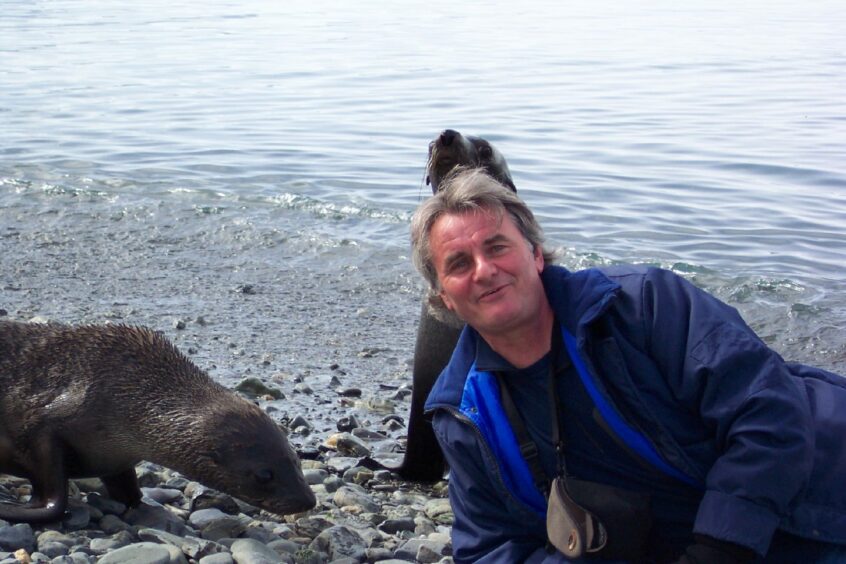A Highland man heading to Antarctica was found dead in the cabin of a deep sea fishing trawler.
David Virgo, 68, an international fisheries observer from Ardersier, between Inverness and Nairn, suffered a bowel infarction, an irreversible injury to the intestine, according to a post-mortem.
His sister Liz Smart said: “David died at sea, doing what he loved best. That is a blessing and a great comfort to me.”
Mr Virgo, an avid pool player who latterly lived in Huntly, was found dead in his cabin on November 24 on board Norwegian deep sea fishing trawler Saga Sea last month, while off the coast of South America, sailing south to the polar region.
As part of his work as an international fisheries observer, Mr Virgo had left the harbour in Montevideo in Uruguay two days before.
Only days earlier, he had bid farewell to sister Liz Smart, of Ardersier’s Nairn Road, promising to be back in touch in the spring following his voyage.
Cause of death given as bowel infarction
After his death the Norwegian ship immediately changed course back to Montevideo. Mr Virgo’s body has since been repatriated.
A post-mortem examination gave the cause of death as a bowel infarction, an irreversible injury to the intestine that can quickly become life-threatening.
His only surviving relatives are his sister and his niece Lesley Macfadyen.
‘All he ever wanted to do was go to sea’
The siblings grew up in the Nairnshire village, raised by parents Tommy and Betty. Tommy also loved the sea and worked all over the world on cruise liners before his death at the age 49.
The late Betty was a nurse who emigrated to New Zealand after the war, where she met Tommy on his working travels.
After the children grew up, Betty again worked abroad as a medical professional in Saudi Arabia.
Liz described how David inherited his parents’ thirst for adventure and love of the high seas.
She said: “All he ever wanted to do was go to sea. When he left school, he went into the Royal Navy, training at HMS Ganges near Ipswich.
“He became an able-bodied seaman but never had any ambition to climb the ranks. He just enjoyed the life.
“He then joined the merchant navy like my father Tommy. It was just in their blood.”
‘He loved his trips to Antarctica and also loved photography’
Mr Virgo, also an experienced diver, later worked offshore in the North Sea, before continuing his love affair with the ocean as an international fisheries observer.
The role entailed anything up to three months on board a fishing boat or factory ship working for a government agency or third-party contractor. At debriefing, he was tasked with detailing any unusual occurrences, safety issues or violations relating to the monitoring and management of fish stocks and marine habitats.
Mrs Smart said: “It was right up his street, but it was quite a lonely, dangerous life.
“He would be pretty much alone on the ship, eating with the captain but not mixing with the crew.
“David valued his independence and wasn’t married – if a girlfriend so much as looked at a jeweller’s shop he was off!
“He loved his trips to Antarctica and also loved photography, taking so many pictures of wildlife and the polar environment.
“When I received the phone call, I just couldn’t believe it. I was just truly gobsmacked.”
When back on dry land, Mr Virgo was an avid pool player with his ex-service friends in Huntly, where he lived latterly, and Liz added: “While his work in later life was very solitary, he was quite a social type.
“He loved music, a drink, a laugh and a party.”
Mr Virgo was cremated privately at his own request. In the spring, his ashes will be buried at Croy cemetery where his parents are buried, near the river where he used to play and fish as a young lad.
Dr Steven Young, a consultant with the sustainable resources consultancy firm MRAG, enlisted Mr Virgo on his working trips to Antarctica.
Dr Young said: “David was an experienced and well-liked contract fisheries observer who had taken on sea deployments for MRAG for over 20 years.
“His passing was a shock and sadness to us all.”

